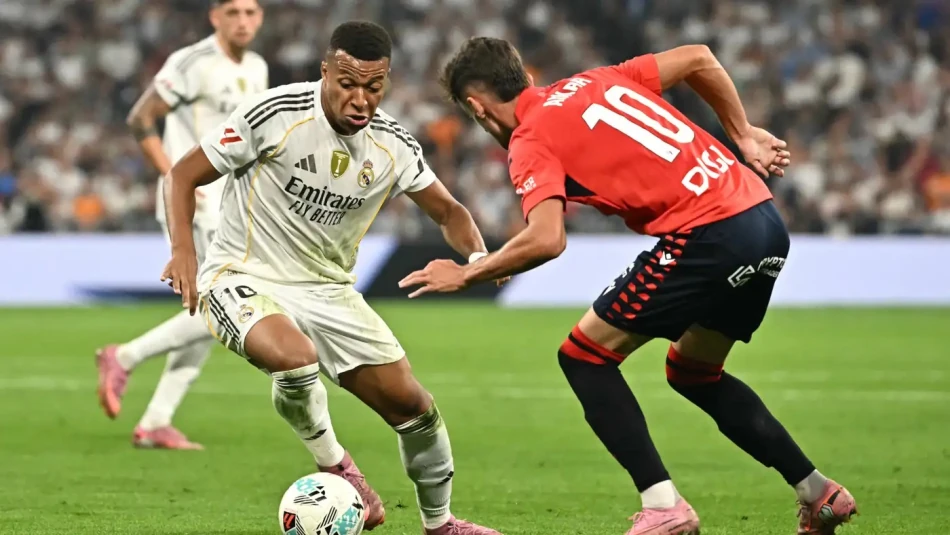
Real Madrid Seeks Redemption: Crucial Match to Reshape Their Image
Real Madrid's New Era Faces Early Test as Alonso Seeks to Prove His Vision
Real Madrid's transition under Xabi Alonso continues to face scrutiny as the Spanish giants prepare for their second La Liga fixture against newly-promoted Real Oviedo. After an unconvincing opening win against Osasuna, Alonso's tactical approach and squad integration remain under the microscope, particularly as he attempts to blend established stars with promising newcomers like Franco Mastantuono in what could define Madrid's domestic campaign trajectory.
Oviedo's Historic Return Creates Perfect Storm
Real Oviedo's return to Spain's top flight after a 25-year absence sets the stage for a compelling David versus Goliath narrative. The Asturian club, managed by Serbian coach Veljko Paunović, earned promotion by defeating Mirandés in the Segunda División playoff final last June, marking one of the longest gaps between top-flight appearances in modern Spanish football.
Their opening fixture revealed the harsh realities of elite competition—a 2-0 defeat to Villarreal despite fielding experienced campaigners like 40-year-old Santi Cazorla and Venezuelan striker Salomón Rondón. The sold-out 30,000-capacity Estadio Carlos Tartiere will provide a hostile environment that could expose any lingering weaknesses in Madrid's early-season preparation.
Historical Context: Promotion Struggles Against Elite Opposition
Newly-promoted teams historically struggle against Europe's elite clubs, with statistics showing that sides returning to top flights after extended absences face particularly steep learning curves. Oviedo's quarter-century absence mirrors cases like Leicester City's remarkable 2015-16 season, though such fairy tales remain exceptional rather than typical.
Alonso's Integration Challenge Intensifies
The former Liverpool and Bayern Munich midfielder inherited a complex tactical puzzle following his appointment before the Club World Cup. His team's semifinal exit and subsequent 4-0 defeat to Paris Saint-Germain highlighted systemic issues that a brief preseason couldn't fully address.
Against Osasuna, Alonso deployed new signings Trent Alexander-Arnold and Deen Haugen alongside Portuguese acquisition Álvaro Carreras, while introducing Argentine prospect Franco Mastantuono in the second half. This rotation policy suggests Alonso is still determining his optimal lineup—a luxury that diminishes as the season progresses.
Market Implications: Squad Depth Under Scrutiny
From an investment perspective, Madrid's summer spending spree totaling over €150 million requires immediate justification. Mastantuono's €72 million transfer from River Plate represents a significant bet on potential rather than proven quality, while the club's ability to integrate multiple new players simultaneously will influence future transfer strategies across European football.
Mastantuono: The €72 Million Question Mark
The 18-year-old Argentine winger embodies both Madrid's long-term vision and immediate pressure points. His six-year contract suggests club confidence in his development trajectory, yet early appearances will determine whether he can handle La Liga's intensity while competing with established players like Brahim Díaz for the right-wing position.
Alonso's praise for Mastantuono's "Argentine determination and competitive spirit" reflects the coach's emphasis on mentality over pure technical ability. However, the player's international debut for Argentina in June adds external pressure that could accelerate his development timeline beyond optimal pacing.
Comparative Analysis: Young South American Talents in Europe
Mastantuono's situation parallels other high-profile South American teenagers who've joined European giants, from Barcelona's Pedri to Manchester City's Julián Álvarez. Success often depends on gradual integration rather than immediate impact, suggesting Alonso's rotation approach may prove strategically sound despite short-term criticism.
Strategic Implications: Building Toward El Derbi
The Oviedo fixture serves as crucial preparation for Madrid's late September clash with Atlético Madrid, a match that could define early-season momentum. Alonso's tactical flexibility will be tested as he balances squad rotation with result consistency, particularly given Madrid's historical struggles in high-pressure local derbies.
The coach's admission that his team "missed certain elements" against Osasuna suggests ongoing tactical refinements. Whether these adjustments prove effective against varied opposition styles will determine if Alonso's appointment represents genuine evolution or merely expensive experimentation in Madrid's pursuit of domestic and European success.
Most Viewed News

 Sara Khaled
Sara Khaled






